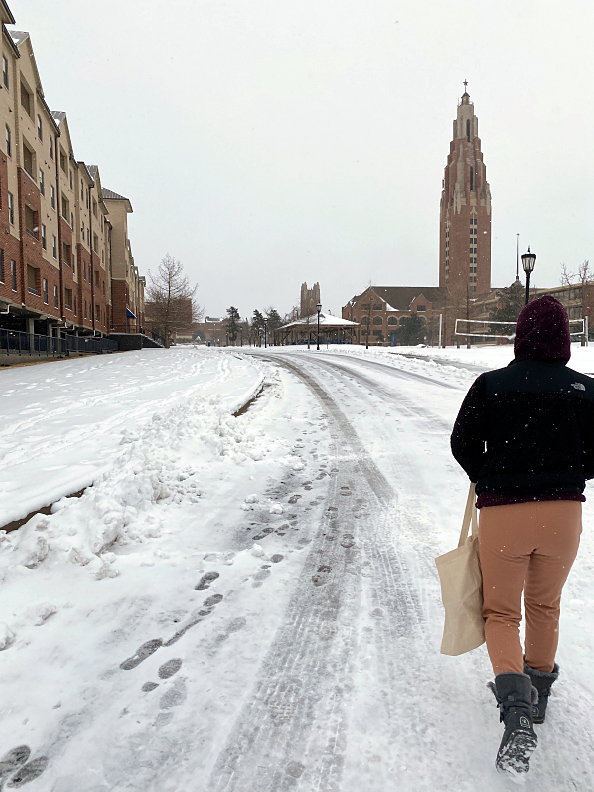
By Tuesday afternoon on Feb. 1, students and faculty began anticipating winter weather and the possibility of school closure. At 10:12 p.m. on Tuesday, the anticipated closure became a reality with a BlueAlert notifying students and university staff that there would be no classes meeting in-person or remotely on Wednesday, February 2. The BlueAlert stated the closures of the main university, the Law School, the Aduddell Fitness Center, mailroom, and the Dulaney-Browne Library. Dining service hours were restricted to weekend brunch and dinner times, and Alvin’s Market was open for a limited window in the morning and afternoon.
Some students used this winter-weather-induced closure to catch up on sleep, work on homework, or find ways to enjoy the snow. Students could be seen outside building snowmen, snow squirrels, and having snowy photoshoots.
At 2:02 p.m. on Wednesday, Feb. 2, another BlueAlert announced that all closures would extend to Thursday, Feb. 3. The same closures and dining hours applied to Thursday. The following day, which was full of consistent snowfall and freezing temperatures, a BlueAlert announced at 1:26 p.m. that Friday, Feb. 4, would be a continuation of closures.
Chief Dexter Nelson with the OCU Campus Police provided insight into school cancellation decisions and the impact of winter weather on the roads and campus safety. Chief Nelson explained that the police play an active role in determining when campus closures should occur.
“As the Chief of Police, I participate as a member of nearly every Emergency Operations Center (EOC) formed on campus. We formed a Weather EOC that meets as needed to discuss the weather forecast, and its effect on our campus,” Chief Nelson said.
In addition to Chief Nelson, another member of the campus police is trained and certified with the Oklahoma First Division of the National Weather Service. This provides the officer with information directly from the Oklahoma Mesonet Service, an organization monitoring Oklahoma weather.
“This allows us to receive weather models, predictions, and information directly from the National Weather Service. We get the same information that our local news stations receive and use to predict the weather,” Chief Nelson said.
Chief Nelson listed factors that impact the decision of school closure. These factors, stated by Chief Nelson, include “…road conditions; utilities availability; the effects of the weather on the City of OKC; the effect of the weather on OCU campus infrastructure and facilities; and other business closings, such as restaurants and childcare facilities, to name a few.”
Road conditions were deemed unsafe for travel due to the winter weather. Students were encouraged to limit unnecessary driving, yet campus police officers were still available to provide vehicular assistance as needed.
Chief Nelson explained the standard vehicular assistance campus officers provide, saying campus officers routinely assist with “battery jumps, vehicle unlocks, they air up tires, they change flat tires if [the student has] a spare, officers transport students to and from auto shops to pick up or drop off vehicles for repairs, and they provide courtesy and security transports for students.”
In addition to maintaining regular vehicular assistance during the winter weather closures, officers provided assistance and service to the OKC community when needed.
“During this latest stretch of winter weather, we have assisted several passing motorists who have no connections to OCU, but broke down or got stuck in a snowbank near the university,” Chief Nelson said.
Campus police vehicles could be seen routinely patrolling the campus parking lots, driving through the Cokesbury Apartment parking lots multiple times each day despite the snow. These patrols served to protect students from potentially intruding individuals, as well as inform students of unknown vehicular issues.
“Officers have notified students when problems were found involving parked vehicles. Some of those problems included, lights left on, trunk lids and doors found open, and parked vehicles involved in accidents,” said Chief Nelson.
Jenna Riling, sophomore dance universal major, performed her own act of service by seeking out a car in the Methodist parking garage which had been sounding security horns repeatedly for several hours during the snow days. Upon finding the alarming car, Riling took a photo and posted it to a Facebook group for OCU students in an attempt to alert the vehicle’s owner.
Chief Nelson explained the importance of patrolling to ensure that no vehicles are parked on campus which are not authorized. The prevalence of theft from automobiles, both with belongings and car parts, has been an issue on campus before. Because of this, officers are vigilant and patrol to ensure all cars utilizing residential parking lots have proper parking permits displayed. Chief Nelson urged that students make sure to display their parking tags clearly, and report any information regarding suspicious vehicles or individuals promptly to the campus police.
The campus reopened Monday, Feb. 7 and classes returned to normal. All classes meeting virtually for Covid-19 mitigation returned to in-person instruction.


Leave a Reply